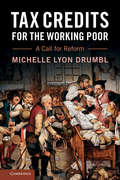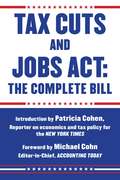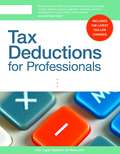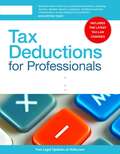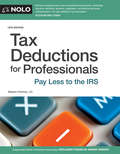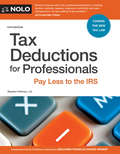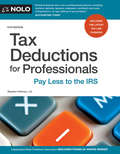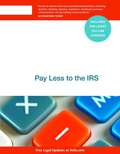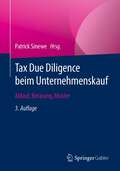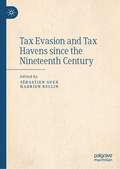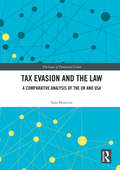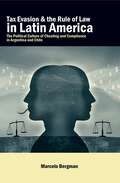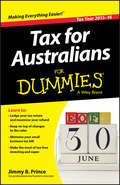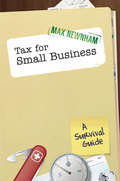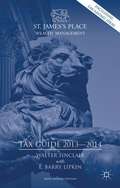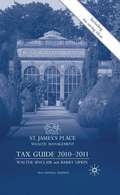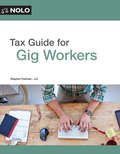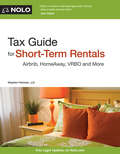- Table View
- List View
Tax Credits for the Working Poor: A Call for Reform
by Michelle Lyon DrumblThe United States introduced the earned income tax credit (EITC) in 1975, where it remains the most significant earnings-based refundable credit in the Internal Revenue Code. While the United States was the first country to use its domestic revenue system to deliver and administer social welfare benefits to lower-income individuals or families, a number of other countries, including New Zealand and Canada, have experimented with or incorporated similar credits into their tax systems. In this work, Michelle Lyon Drumbl, drawing on her extensive advocacy experience representing low-income taxpayers in EITC audits, analyzes the effectiveness of the EITC in the United States and offers suggestions for how it can be improved. This timely book should be read by anyone interested in how the EITC can be reimagined to better serve the working poor and, more generally, whether the tax system can promote social justice.
Tax Cut of 1964
by Michael G. RukstadExamines the intellectual, political and economic underpinnings of the landmark tax legislation begun by John F. Kennedy and carried through Congress by his successor Lyndon B. Johnson.
Tax Cuts and Jobs Act: The Complete Bill
by Patricia Cohen Michael CohnAt the end of 2017, Congress passed the biggest tax plan since 1986. Whether you were for or against the sweeping overhaul, the Tax Cuts and Jobs Act will begin to affect individuals and businesses as early as January 2018. Yet, until now, relatively few people have had access to it or read it. Whether you file on your own, use someone to prepare your taxes, or you are an accountant yourself, to really understand how the bill will affect you means you must dig in. And having this complete resource, including the full text of the bill, will help you navigate its complexities. From dramatic reductions in taxes for corporations and other businesses, to an increase to standard individual deductions, there are many changes that Americans need to understand before the IRS comes calling. With insider analysis and insight from Patricia Cohen, who covers the national economy for the New York Times and whose front-page stories on this topic informed a nation, as well as specific tips from Michael Cohn, editor-in-chief of AccountingToday.com, this is an indispensable reference.
Tax Deductions for Professionals
by Stephen Fishman J.D.Reduce your tax burden with the only plain-English guide to deductions written especially for professionals. Winner of the Independent Book Publishers Association's Benjamin Franklin Award. Architects, lawyers, dentists, chiropractors, doctors and other licensed professionals are subject to special tax rules. With this book, learn how to pay less to the IRS at tax time by taking advantage of valuable tax deductions you are entitled to take. Comprehensive, easy-to-read, and filled with interesting examples, Tax Deductions for Professionals lays out and explains the common deductions you may qualify to take, including: start-up and operating expenses health care expenses vehicles and travel entertainment and meals retirement plan contributions continuing education costs professional fees home office expenses Tax Deductions for Professionals will also help you choose the best legal structure for your practice, with detailed information on limited liability companies, partnerships, and professional corporations. The new edition is completely updated with the latest tax numbers and laws for 2014 returns.
Tax Deductions for Professionals (4th edition)
by Stephen FishmanUnderstanding tax deductions is an essential part of any small business without the money saved by taking deductions, many businesses couldn't even get started or operate profitably once they are up and running. With this book, professionals who own their own practice can rest assured that they will learn all they need to know about the many deductions that they are legally entitled to take. Organized into practical, easy-to-use categories of the most commonly-used business deductions, also provides basic general information on how businesses are taxed and how tax deductions work, many people (including professionals) quit a job to start their own business, which means that they have no previous experience with business deductions and they need to get up to speed quickly. The 4th edition is updated with all the latest laws and tax numbers for 2009.
Tax Deductions for Professionals: Pay Less to the IRS
by Stephen FishmanThe book is organized into practical, easy-to-use categories of the most commonly-used business deductions for professionals who own their practice. It covers start-up expenses, health care costs, continuing education, professional fees, home office, and more.
Tax Deductions for Professionals: Pay Less to the IRS
by Stephen FishmanA tax deduction guide just for professionals. Keep your taxes under control! Architects, lawyers, dentists, chiropractors, doctors, and other licensed professionals are subject to special tax rules. With this book, learn how to pay less to the IRS at tax time by taking advantage of valuable tax deductions you are entitled to take. Find out how to deduct: start-up expenses medical expenses under Obamacare retirement plan contributions continuing education costs vehicles, meals, and travel, and home office expenses. Tax Deductions for Professionals will also help you choose the best legal structure, with detailed information on limited liability companies, partnerships, and professional corporations. This edition includes comprehensive coverage of the new tax law (the Tax Cuts and Jobs Act) and how it affects professionals who have a business or are thinking of starting one.
Tax Deductions for Professionals: Pay Less to the IRS
by Stephen FishmanA tax deduction guide just for professionals Keep your taxes under control! Architects, lawyers, dentists, chiropractors, doctors, and other licensed professionals are subject to special tax rules. With this book, learn how to pay less to the IRS at tax time by taking advantage of the many tax deductions available to professionals. Find out how to deduct: start-up expenses medical expenses retirement plan contributions continuing education costs vehicles, meals, and travel, and home office expenses. Tax Deductions for Professionals will also help you choose the best legal structure, with detailed information on limited liability companies, partnerships, and professional corporations. The 15th edition is updated to cover changes under the Tax Cuts and Jobs Act.
Tax Deductions for Professionals: Pay Less to the IRS
by Stephen Fishman J.D.A tax deduction guide just for professionals. Winner of the Independent Book Publisher's Association's Benjamin Franklin Award. Keep your taxes under control! Architects, lawyers, dentists, chiropractors, doctors and other licensed professionals are subject to special tax rules. With this book, learn how to pay less to the IRS at tax time by taking advantage of valuable tax deductions you are entitled to take. Find out how to deduct: start-up expenses medical expenses under Obamacare retirement plan contributions continuing education costs vehicles, meals and travel, and home office expenses. Fully updated to cover all changes in the tax laws with updated tax numbers. Tax Deductions for Professionals will also help you choose the best legal structure, with detailed information on limited liability companies, partnerships, and professional corporations.
Tax Due Diligence beim Unternehmenskauf: Ablauf, Beratung, Muster
by Patrick SineweDie Due Diligence bezeichnet die gebotene Sorgfalt, mit der beim Kauf bzw. Verkauf von Personen- oder Kapitalgesellschaften, Betrieben oder Immobilien das zu erwerbende Unternehmen im Vorfeld der Akquisition von der Unternehmensführung und deren Beratern überprüft und analysiert wird. Die auch in Deutschland unverzichtbare steuerliche Untersuchung und Analyse des Zielunternehmens (Tax Due Diligence) dient dem Ziel, die mit der Akquisition verbundenen Chancen und Risiken im steuerlichen Bereich zu identifizieren. Sie ist Grundlage für die Aufnahme von Garantie-, Haftungs- und Freistellungsklauseln im Unternehmenskaufvertrag und kann unterstützend bei der Kaufpreisfindung herangezogen werden.Für die 3. Auflage wurde das Werk vollständig aktualisiert. Es beantwortet alle praxisrelevanten Fragen und stellt zahlreiche Musterformulierungen für den Bericht des Beraters und den Kaufvertrag zur Verfügung.
Tax Evasion and Tax Havens since the Nineteenth Century
by Sébastien Guex Hadrien BuclinThis collective book offers a panorama of the history of tax evasion, tax avoidance and tax havens from the nineteenth century to the present day, based on the latest research in contemporary history. It aims to show that this phenomenon is at the heart of global capitalism, partly as a response of the ruling classes to the rise of progressive taxation, but for other reasons too: notably the development of a powerful tax evasion and avoidance industry in different countries. The book argues that tax competition between states has stimulated the development of tax havens. It discusses the notion of the ‘tax haven’ and proposes a more rigorous concept - that of the ‘tax predator’. Finally, the book sheds light on the socio-political conflicts that have developed around tax evasion and the way in which states have fought against or tolerated the phenomenon.
Tax Evasion and the Law: A Comparative Analysis of the UK and USA (ISSN)
by Sam BourtonThis book provides a critical and contemporary evaluation of the laws and enforcement policies pertaining to tax evasion in the United Kingdom (UK) and United States (US). Since the inception of taxes, revenue collection authorities around the world have attempted to address the seemingly perennial problem of individuals evading their tax liabilities. The financial crisis has shone a new light on the issue with an increased interest in using the criminal justice system as a means of addressing it in the UK. In sharp contrast to the UK, the US has a strong record of prosecuting crimes of tax evasion, whether committed by individuals or professional corporate facilitators. Providing an evaluation of the UK’s tax evasion laws and enforcement policy, through a comparative approach, this work highlights insights provided by the US experience. In so doing, the book explores the interconnections between tax evasion and money laundering, identifying best practices, omissions, and areas for reform. The work will be a valuable resource for researchers, academics, and policy-makers working in the areas of financial crime, financial law, accountancy and criminal justice.
Tax Evasion and the Rule of Law in Latin America: The Political Culture of Cheating and Compliance in Argentina and Chile (G - Reference, Information and Interdisciplinary Subjects)
by Marcelo BergmanFew tasks are as crucial for the future of democracy in Latin America—and, indeed, in other underdeveloped areas of the world—as strengthening the rule of law and reforming the system of taxation.In this book, Marcelo Bergman shows how success in getting citizens to pay their taxes is related intimately to the social norms that undergird the rule of law. The threat of legal sanctions is itself insufficient to motivate compliance, he argues. That kind of deterrence works best when citizens already have other reasons to want to comply, based on their beliefs about what is fair and about how their fellow citizens are behaving. The problem of "free riding," which arises when cheaters can count on enough suckers to pay their taxes so they can avoid doing so and still benefit from the government’s supply of public goods, cannot be reversed just by stringent law, because the success of governmental enforcement ultimately depends on the social equilibrium that predominates in each country. Culture and state effectiveness are inherently linked.Using a wealth of new data drawn from his own multidimensional research involving game theory, statistical models, surveys, and simulations, Bergman compares Argentina and Chile to show how, in two societies that otherwise share much in common, the differing traditions of rule of law explain why so many citizens evade paying taxes in Argentina—and why, in Chile, most citizens comply with the law. In the concluding chapter, he draws implications for public policy from the empirical findings and generalizes his argument to other societies in Africa, Asia, and Eastern Europe.
Tax Expenditure Management
by Mark Burton Kerrie SadiqA tax expenditure is a 'tax break' allowed to a taxpayer or group of taxpayers, for example, by way of concession, deduction, deferral or exemption. The tax expenditure concept, as it was first identified, was designed to demonstrate the similarity between direct government spending on the one hand and spending through the tax system on the other. The identification of benefits provided through the tax system as tax expenditures allows analysts to consider the fiscal significance of those parts of the tax system which do not contribute to the primary purpose of raising revenue. Although a seemingly simple concept, it has generated a range of complex definitional and practical issues, and this book identifies and critically assesses the controversial aspects of tax expenditure and tax expenditure management.
Tax Fairness and Folk Justice
by Steven M. SheffrinWhy have Americans severely limited the estate and gift tax - ostensibly targeted at only the very wealthy - but greatly expanded the subsidies to low-wage workers through the Earned Income Tax Credit, now the single largest poverty program in the country? Why do people hate the property tax so much, yet seemingly revolt against it only during periods of economic change? Why are some groups of taxpayers more obedient to the tax authorities than others, even when they face the same enforcement regime? These puzzling questions all revolve around perceptions of tax fairness. Is the public simply inconsistent? A sympathetic and unified explanation for these attitudes is based on understanding the everyday psychology of fairness and how it comes to be applied in taxation. This book demonstrates how a serious consideration of "folk justice" can deepen our understanding of how tax systems actually function and how they can perhaps be reformed.
Tax For Australians For Dummies
by Jimmy B. PrinceTackle your tax with confidence and get the most from your returnDo you want to be sure you're getting the maximum tax refund? Of course you do! And Tax for Australians For Dummies, 2013-2014 Edition is the only resource you need to ensure that you get every cent you deserve. Written by respected tax specialist and CPA fellow Jimmy B. Prince, this book guides you step by step through the complex Australian tax system to help you understand exactly what you can claim and exactly what you're owed.Providing complete coverage of changes to tax legislation for tax year 2013-2014, as well as proposed changes that haven't made it into law yet, this book has you covered from every angle. Designed to help you take advantage of everything from investments to kids to government concessions, Tax for Australians For Dummies tells you everything you need to know to beat the taxman at his own game.Written specifically for Australian taxpayersFully updated for the 2013-2014 tax yearIncludes everything you need to maximise your tax refundContains essential new information on recent tax changes, including updated tax rates, FBT, CGT, and superannuation thresholdsWhether you're an employee, investor, small business owner, retiree, or even student, Tax for Australians For Dummies, 2013-2014 Edition is the easy-to-follow guide that answers all your tax questions.
Tax For Small Business
by Max NewnhamDon't just survive tax time -- discover how your business can thrive through tax time!Operating a small business isn't easy. Each day business owners are challenged with everything from supervising staff and negotiating with suppliers to managing payroll and inventory -- and, ultimately, turning a profit.Thankfully, ensuring that your business is tax-compliant is no longer the ordeal it used to be. Tax for Small Business: A Survival Guide is a must-have reference for Australian small businesses, with all the information you'll need to legally minimise your tax and maximise your business's profits. Topics covered include:the Simplified Tax System (STS)income taxsuperannuationcapital gains taxfringe benefits taxGST, BAS and PAYGworker's insuranceland tax.
Tax Guide
by Walter Sinclair Barry LipkinThe 41st annual edition of the leading guide to taxation in Britain. This practical and user-friendly guide is a bestseller with students, professionals, accountants and private individuals, explaining in simple terms how the UK tax system works and how best to minimise tax liabilities.
Tax Guide 2010–2011
by Walter Sinclair Barry LipkinThe 39th annual edition of the leading guide to taxation in Britain. This practical and user-friendly guide is a bestseller with students, professionals, accountants and private individuals, explaining in simple terms how the UK tax system works and how best to minimise tax liabilities.
Tax Guide 2011–2012
by Walter SinclairThe 40th annual edition of the leading guide to taxation in Britain. This practical and user-friendly guide is a bestseller with students, professionals, accountants and private individuals; explaining in simple terms how the UK tax system works and how best to minimise tax liabilities.
Tax Guide 2012–2013
by Barry LipkinThe 41st annual edition of the leading guide to taxation in Britain. This practical and user-friendly guide is a bestseller with students, professionals, accountants and private individuals, explaining in simple terms how the UK tax system works and how best to minimise tax liabilities.
Tax Guide 2014–2015
by Walter Sinclair Barry LipkinThe 43rd annual edition of the leading guide to taxation in Britain. This practical and user-friendly guide is a bestseller with students, professionals, accountants and private individuals, explaining in simple terms how the UK tax system works and how best to minimise tax liabilities.
Tax Guide for Gig Workers
by Stephen FishmanWritten for the growing numbers of freelancers who are part of the burgeoning gig economy. At least 10% of the American workforce are now gig workers who obtain jobs through online hiring platforms like Uber, Lyft, Upwork, TaskRabbit and many others. Gig workers are typically treated as self-employed, which means their taxes are far more complicated than those of traditional employees. Many gig workers lose valuable deductions or otherwise overpay their taxes or get in trouble with the IRS because they don’t understand the tax rules that apply to them. Tax Guide for Gig Workers explains everything gig workers need to know about taxes, including how they are classified for tax purposes, how to pay self-employment and estimated taxes, what deductions to take, how to lower their taxes by taking advantage of the new 20% pass-through deduction, what records to keep, how to file a tax return, and more. Whether you drive for Uber or Lyft, code for Upwork clients, or perform paid chores through TaskRabbit, this book gives you the practical information you need to minimize your taxes while avoiding problems with the IRS.
Tax Guide for Short-Term Rentals: Airbnb, HomeAway, VRBO and More
by Stephen FishmanThe complete tax guide for Airbnb and other short-term rental hosts As a short-term rental host, you’re entitled to many valuable deductions and other tax benefits. This book—the first of its kind—shows you how to pay no more tax than necessary on your rental income while complying with IRS rules. Learn everything you need to know about taxes, including: what deductions you should be taking how to report your short-term rental income how to deduct losses vacation home and tax-free rental rules how to allocate costs when you rent a room in your home, and how to keep proper records. Whether you rent your property through Airbnb, FlipKey, HomeAway, TripAdvisor, Craigslist, or VRBO, you want to make sure you understand these tax rules. That way, you can rest assured you are making the most out of your hosting business without risking problems with the IRS.
Tax Harmonization in the European Community
by George KopitsA report from the International Monetary Fund.
